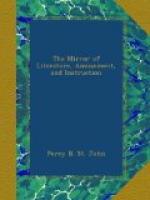Pope Ganganelli compared the Italians with the fire, the French with the air, the English with the water, and us Germans with the earth, omne simile claudicat. The German is not so nimble, brisk, and witty as the Frenchman; the latter gallops ventre a terre, whilst the German at the utmost trots, but holds out longer. The German is not so proud, humoursome, and dry as the Englishman; not so indolent, bigoted, and niggardly as the Italian; but a plain, faithful, modest fellow, indefatigable, staid, quiet, intelligent and brave, yet almost always misknown, purely from his constitution. The words of Tacitus still are true: “nullos mortalium armis aut fide ante Germanos.” Should you class the four most cultivated nations of Europe, according to the temperaments, the German would be Phlegma; and as such, I, a German, in German modesty, which foreign countries should duly acknowledge, can assign it only the fourth rank. Among the English, whims are mixed in every thing; amongst the French, gallantry; among the Spaniards, bigotry; among the Germans, when things can go halfway, eating, drinking, and smoking; and the last is the true support of Phlegma. Genius with the Germans, tends to the root, with the French to the blossom, with the British to the fruit. The Italians are imagination; the French, wit; the English, understanding; the Germans, memory. In colonies, Spaniards commence by building a church and cloister; Englishmen a tavern; Frenchmen a fort, where, however, the dancing-floor must not be wanting; the Germans by grubbing the field. A riding-master distinguished them even by their modes of riding; the English hop, the French ride like tailors, the Italian sits on his steed like a frog in the air-pump, the Spaniards sleep there, the Russians wind the upper part of their bodies like puppets, and the German alone sits still like a man—man and horse are one as with the Hungarians.
The royal oak, the favourite tree of our fathers, requires centuries for its full developement, and so long do we also require. The oak is a fairer symbol of the German nation than the German postboy, from which original most foreigners appear to judge of us. A postilion in the north, however, is the true representative of Phlegma. Bad or good roads, bad or good weather, bad or good horses and coach, curses or flattery from the traveller—nothing moves him if his pipe-stump be but smoking, and his schnaps paid.
The hereditary enemy of our neighbours is levity, ours heaviness. In the ancient bass-fiddle, Europe, the thickest string is the German, with deep tone and heavy vibration; but once in vibration, it hums as if it would go on humming for an eternity. Our primitive ancestors deliberated on every thing twice—in drunkenness, and in sobriety; and then they acted. But we, with the most honest and slowest spirit of order—which might, without danger, be spared many reglemens—we




